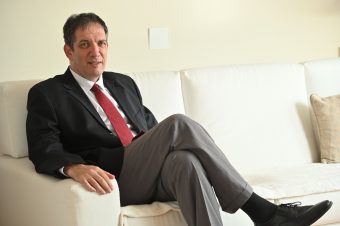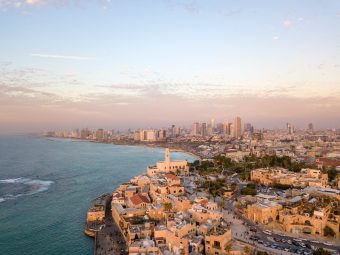
It seems that we can learn the most about how to wisely manage resources from countries that do not have them at their disposal to a significant extent. Among those shining examples is certainly the country of Israel, which has become a leader in the treatment of water and its efficient use out of necessity, since 60 per cent of this country is desert. It was a real challenge to solve the water shortage and find the best way to use the modest water reserves, says Yahel Vilan, Israel’s Ambassador to Serbia.
We also asked our interlocutor about the deadline for the suspension of electricity production from coal, the development of infrastructure for charging electric vehicles, and economic cooperation between Israel and Serbia.
EP: This year, Serbia and Israel are marking 30 years since the renewal of diplomatic relations. What are the relations between the two countries, in political and, of course, in economic terms?
Yahel Vilan: The embassy of Israel will mark this jubilee with different activities. We are preparing numerous projects in the spheres of culture, public diplomacy, and economy. Relations between Israel and Serbia have a positive trend of development. Bilateral trade has a steady upward trend. This year we reached 107 million USD representing growth by 31 per cent on an annual basis, a very nice figure. We have several agreements in force, such as the Agreement on Cooperation in Agriculture, Agreement on Protection of Investments, Avoidance of Double Taxation, Protocol on Cooperation between Israeli aid agency Mashav and Serbian Ministry of Agriculture etc. Unfortunately, we don’t have a Free Trade Agreement, which would enable further, faster growth of trade. During the visit of President Rivlin, the two countries formed a Joint Committee on Economic and Trade Cooperation, whose first sitting hopefully will happen this year. Unfortunately, the situation with the pandemic slowed down certain bilateral activities. A valuable step forward in economic relations was opening the Representative Office of Chamber of Commerce and Industry of Serbia in Jerusalem this autumn. It contributes to expanding and deepening economic relations, especially in innovation, entrepreneurship, and hi-tech.
In focus:
EP: As far as we know, many Israeli companies are interested in investing in Serbia, especially in the RES sector, in solar primarily. What is cooperation in the field of energy?
Yahel Vilan: Cooperation in the field of energy is on the rise, especially in the last 2-3 years. We are about to sign an MOU (Memorandum of Understanding) on Cooperation in Green Energy. Serbia has an ambitious goal of achieving 40 per cent of energy from renewable sources by 2040 and new regulations (Laws and By-Laws) which make the environment for investments favorable. Israeli companies are eager to contribute to this goal by investing in wind and solar energy primarily. As you mentioned solar, yes, the embassy has marked an increased interest in companies investing and setting up their operations in the upcoming period.
EP: Kovačica Wind Farm, capacity 104.5 NW, investment of the Israeli company Enlight Energy is the most valuable Israeli investment in Serbia, 189 million euros worth. The same company has developed the Pupin wind farm, which is ready for construction and is awaiting auctions. Does that mean that Serbia is a good place to invest?
Yahel Vilan: Investment of Enlight Energy is the first and the most significant Israeli investment in green energy in Serbia. It has set the ground for other companies to come based on their positive experience. The company is expanding its operations with the Pupin wind farm, which means Serbia is a stable investment environment with a positive business outlook. Serbia proved to be a stable and predictive business environment during the pandemic based on macroeconomic indicators and generous packages of assistance provided to the economy and citizens.
EP: What energy sources does Israel use, and how much has it moved in the process of the energy transition?
Yahel Vilan: There is a growing awareness in Israel and worldwide of the importance of turning to renewable energy sources such as solar radiation, wind, biogas/biomass, earth heat and other sustainable natural resources. Reducing dependency on imported fuels contributes to the energy independence of any state. This is of strategic importance for Israel, which is like an electric island because it is not connected to any network!

Only in the last decade has the country paved a way towards becoming a significant natural gas supplier. As of 2018, the country’s electricity output is mainly generated from natural gas (66 per cent) and coal (30 per cent), while at least 3 per cent is generated from renewables. In 2019, the Israeli government announced its target to phase out coal-fired power generation by the end of 2025, five years earlier than originally targeted. To achieve this, the government plans to “switch” the Ashkelon coal-fired power plant to natural gas by 2024 and intends to do the same with two more coal-fired plants at Hadera’s Orot Rabin by the end of 2025.
Israeli Ministry of Energy outlined the main objectives by the year 2030, which will make Israel fully comply with Paris Agreement on Climate Change: These include stopping the use of coal in electricity production and switching to electricity production using natural gas, a 17 per cent share of RES in electricity production by 2030 and a reduction in national electricity consumption of at least 17 per cent. In this energy mix, the benefits are economic, environmental, and health.
Interviewed by: Danijela Isailović
Read the story in the new issue of the Energy portal Magazine ELECTROMOBILITY.



